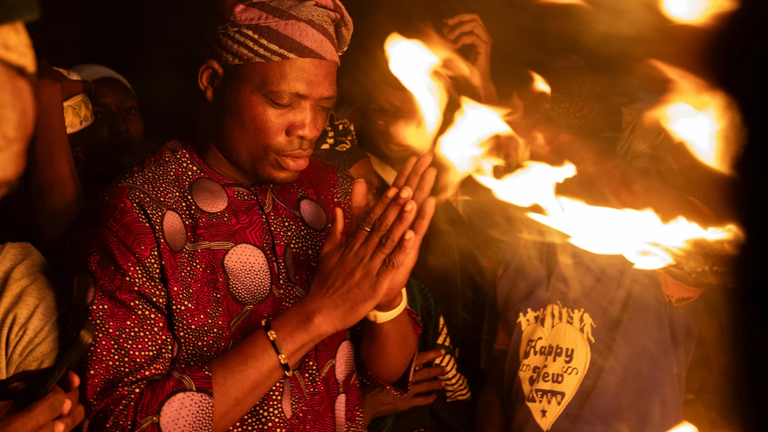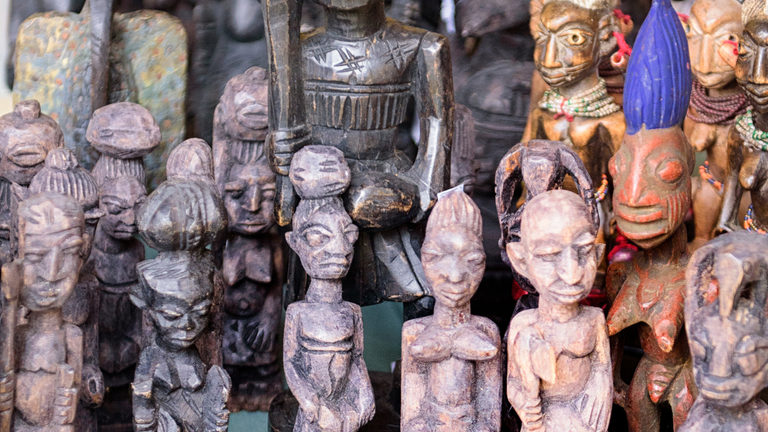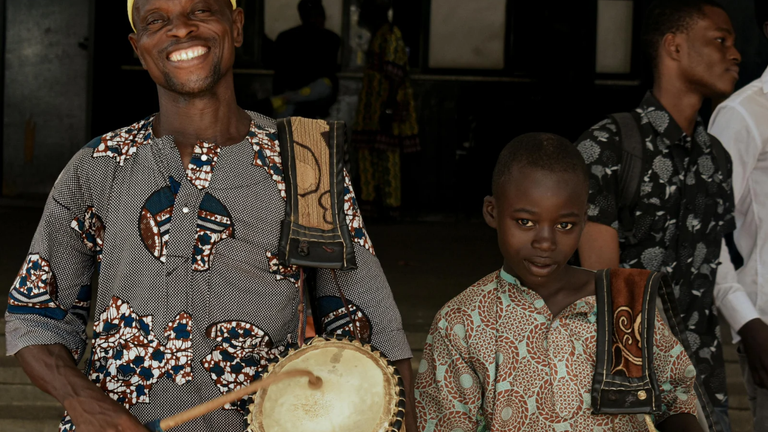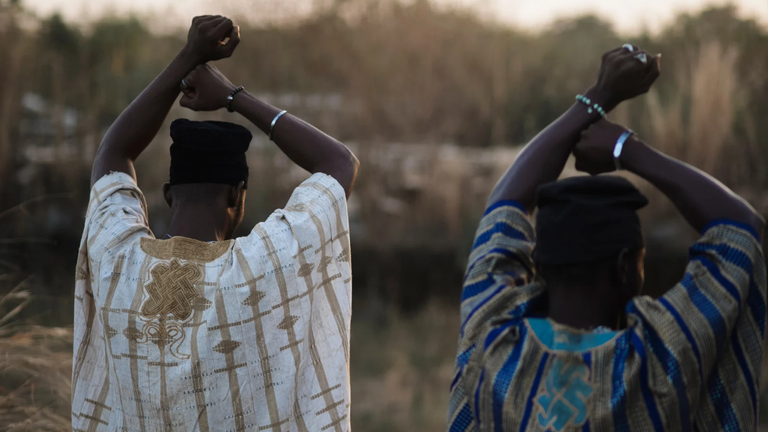One of the beauties of our world is how our interaction activities influence our culture all across the world, and in our world today you'll visit different places and realized there is evidence of the culture of other parts of the world being practiced there; among those are how African cultures that have gone on to influence different activities in Latin America, and what started as a mere slave trade and exploration of people has gone on to lead to the development of new norms among the people of these places.
Una de las bellezas de nuestro mundo es cómo nuestras actividades de interacción influyen en nuestra cultura en todo el mundo, y en nuestro mundo de hoy visitarás diferentes lugares y te darás cuenta de que hay evidencia de la cultura de otras partes del mundo que se practica allí; entre ellas está cómo las culturas africanas han pasado a influir en diferentes actividades en América Latina, y lo que comenzó como un mero comercio de esclavos y exploración de personas ha pasado a conducir al desarrollo de nuevas normas entre los pueblos de estos lugares.

Even though I've not been to Latin American countries before, I've watched movies played by people from that place, listened to music, and seen dances of people of these countries, and one thing I notice is the touches of African culture in these acts; even national TV stations of these countries showcase things that, if not for the skin colors being different, I would have mistaken for African because of how deeply rooted and knitted they are to these African cultures and traditions.
One of the most notable of these, which is quite evident to me, is that of the people of Brazil, who, via the slave trade of years past, and how Africans who once lived their lives have ended up influencing the citizens to the point where they adopt some of these traditional African exhibits while they're there.
Aunque no he estado antes en países latinoamericanos, he visto películas interpretadas por gente de allí, he escuchado música y he visto bailes de gente de estos países, y una cosa que noto son los toques de cultura africana en estos actos; incluso las televisiones nacionales de estos países muestran cosas que, si no fuera porque el color de la piel es diferente, las habría confundido con africanas por lo arraigadas y unidas que están a estas culturas y tradiciones africanas.
Una de las más notables, que para mí es bastante evidente, es la del pueblo de Brasil, que, a través de la trata de esclavos de años pasados, y de cómo los africanos que una vez vivieron sus vidas han acabado influyendo en los ciudadanos hasta el punto de que adoptan algunas de estas exhibiciones tradicionales africanas mientras están allí.

You see, during the slave trade, many Africans were shipped from Africa to different parts of the world, including Latin America, to work as slaves or servants, to work on plantations and mines, but regardless of how terribly these Africans were treated, they didn't forget their roots or their traditions, so amidst all this, they kept up with their culture in food, songs, religion, and the likes, and gradually the Latin Americans saw these and adopted some of these, and it goes on to be part of their own way of life.
Verán, durante la trata de esclavos, muchos africanos fueron enviados desde África a diferentes partes del mundo, incluida América Latina, para trabajar como esclavos o sirvientes, para trabajar en plantaciones y minas, pero a pesar de lo terriblemente tratados que fueron estos africanos, no olvidaron sus raíces ni sus tradiciones, así que en medio de todo esto, mantuvieron su cultura en comida, canciones, religión y cosas por el estilo, y poco a poco los latinoamericanos las vieron y adoptaron algunas de ellas, y pasan a formar parte de su propia forma de vida.

So, like I said, Brazil is one of the most notable Latin American countries that has been influenced by numerous African cultures. I know this because I've even seen them display many things that are associated with my own culture, in dressing and religion. You see, I'm a Yoruba man from Nigeria, and the religion of the Yoruba people back then was traditional worship of different gods, which, when I watch some Brazilian TVs and cultures, I see and hear them have words that are of the same meaning as a Yoruba language.
Como he dicho, Brasil es uno de los países latinoamericanos más notables que ha recibido la influencia de numerosas culturas africanas. Lo sé porque incluso les he visto mostrar muchas cosas que se asocian con mi propia cultura, en el vestir y en la religión. Verán, yo soy yoruba, de Nigeria, y la religión del pueblo yoruba en aquel entonces era la adoración tradicional a diferentes dioses, lo cual, cuando veo algunas televisiones y culturas brasileñas, veo y oigo que tienen palabras que tienen el mismo significado que un idioma yoruba.
Meaning one they've adopted the African Yoruba peoples language, two they've also adopted and been influenced by the religion on those first African men that use to leave there, I heard that during the slave trade, many of the Latin America were inflicted with a illness that was claiming lives but the African who lives there weren't dying, and so when the pay a visit to those African to know they're surviving, was when they find out their traditions rite and natura herb usage they helped heal many of the Brazilian from that pleague and since then, they adopted the natural herb and traditional worshiping, making it there own as well.
Significa que han adoptado la lengua de los pueblos africanos Yoruba, dos también han adoptado y han sido influenciados por la religión de los primeros hombres africanos que solían salir de allí, he oído que durante la trata de esclavos, muchos de América Latina fueron infligidos con una enfermedad que se cobraba vidas, pero los africanos que viven allí no estaban muriendo, asi que cuando visitaron a esos africanos para saber que estaban sobreviviendo, fue cuando descubrieron sus tradiciones y el uso de hierbas naturales que ayudaron a curar a muchos de los brasileños de esa plaga y desde entonces, adoptaron las hierbas naturales y el culto tradicional, haciendolo suyo tambien.

Also, the notable Brazilian samba dance and music genre originated in Africa, making it one of the notable aspects of things influenced by African culture on Latin American Brazilian people.
Other countries in Latin America also have such influence, countries like Cuba in their popular music, such as conga, rumba, and timba; their origins are traced to Africa, and so is their dance, like salsa and cha-cha-cha, not forgetting that just like the Brazilian people, Cuban people also adopted the African traditional worshiping of orisha.
Además, el notable género musical y de baile de la samba brasileña tiene su origen en África, por lo que es uno de los aspectos notables de las cosas influenciadas por la cultura africana en los brasileños latinoamericanos.
Otros países de América Latina también tienen esa influencia, países como Cuba en su música popular, como la conga, la rumba y la timba; sus orígenes se remontan a África, y lo mismo ocurre con su baile, como la salsa y el chachachá, sin olvidar que al igual que el pueblo brasileño, el pueblo cubano también adoptó el culto tradicional africano a los orishas.

We've also got many others, such as Haiti, Colombia, Peru, and the likes, whose African culture has been closely knitted in their language, music, cuisine, dance, religion, and the likes; overall, it's the beauty of humanity for you and how our interaction with one another influences the things we do and how we do them.
También hay muchos otros países, como Haití, Colombia, Perú, etc., cuya cultura africana ha estado estrechamente ligada a su lengua, música, cocina, danza, religión, etc. En general, para usted es la belleza de la humanidad y cómo nuestra interacción mutua influye en las cosas que hacemos y en cómo las hacemos.
All photos are taken and edited on canva.
Todas las fotos se toman y editan en
Posted Using INLEO